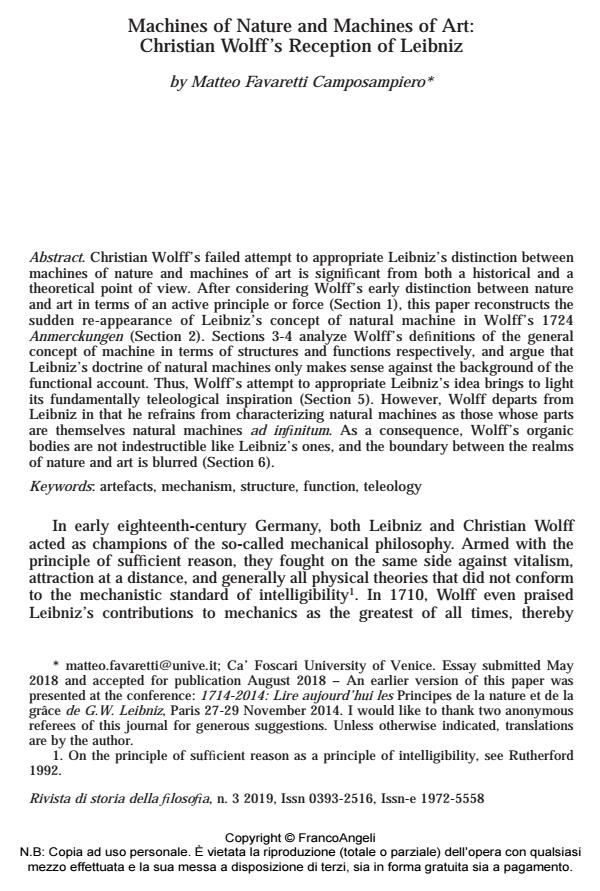Machines of Nature and Machines of Art: Christian Wolff’s Reception of Leibniz
Titolo Rivista RIVISTA DI STORIA DELLA FILOSOFIA
Autori/Curatori Matteo Favaretti Camposampiero
Anno di pubblicazione 2019 Fascicolo 2019/3
Lingua Inglese Numero pagine 22 P. 431-452 Dimensione file 80 KB
DOI 10.3280/SF2019-003002
Il DOI è il codice a barre della proprietà intellettuale: per saperne di più
clicca qui
Qui sotto puoi vedere in anteprima la prima pagina di questo articolo.
Se questo articolo ti interessa, lo puoi acquistare (e scaricare in formato pdf) seguendo le facili indicazioni per acquistare il download credit. Acquista Download Credits per scaricare questo Articolo in formato PDF

FrancoAngeli è membro della Publishers International Linking Association, Inc (PILA), associazione indipendente e non profit per facilitare (attraverso i servizi tecnologici implementati da CrossRef.org) l’accesso degli studiosi ai contenuti digitali nelle pubblicazioni professionali e scientifiche.
Christian Wolff’s failed attempt to appropriate Leibniz’s distinction between machines of nature and machines of art is significant from both a historical and a theoretical point of view. After considering Wolff’s early distinction between nature and art in terms of an active principle or force (Section 1), this paper reconstructs the sudden re-appearance of Leibniz’s concept of natural machine in Wolff’s 1724 Anmerckungen (Section 2). Sections 3-4 analyze Wolff’s definitions of the general concept of machine in terms of structures and functions respectively, and argue that Leibniz’s doctrine of natural machines only makes sense against the background of the functional account. Thus, Wolff’s attempt to appropriate Leibniz’s idea brings to light its fundamentally teleological inspiration (Section 5). However, Wolff departs from Leibniz in that he refrains from characterizing natural machines as those whose parts are themselves natural machines ad infinitum. As a consequence, Wolff’s organic bodies are not indestructible like Leibniz’s ones, and the boundary between the realms of nature and art is blurred (Section 6).
Parole chiave:Artefacts, mechanism, structure, function, teleology
- Immortal animals, subtle bodies, or separated souls: the afterlife in Leibniz, Wolff, and their followers Matteo Favaretti Camposampiero, in Intellectual History Review /2023 pp.651
DOI: 10.1080/17496977.2022.2116199 - Vegetative Powers Matteo Favaretti Camposampiero, pp.419 (ISBN:978-3-030-69708-2)
- Mechanism, Life and Mind in Modern Natural Philosophy Matteo Favaretti Camposampiero, pp.279 (ISBN:978-3-031-07035-8)
- Galen and the Early Moderns Matteo Favaretti Camposampiero, pp.155 (ISBN:978-3-030-86307-4)
Matteo Favaretti Camposampiero, Machines of Nature and Machines of Art: Christian Wolff’s Reception of Leibniz in "RIVISTA DI STORIA DELLA FILOSOFIA" 3/2019, pp 431-452, DOI: 10.3280/SF2019-003002